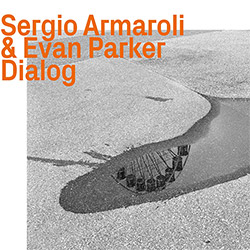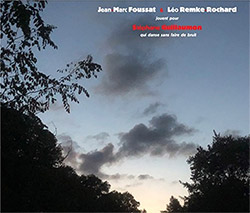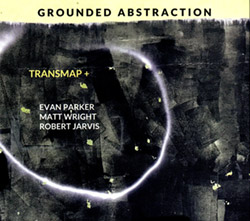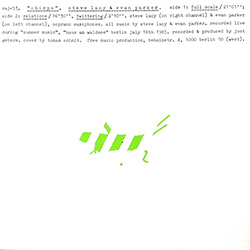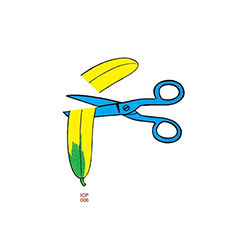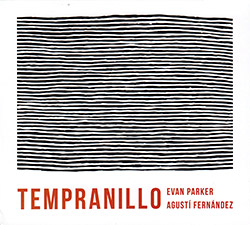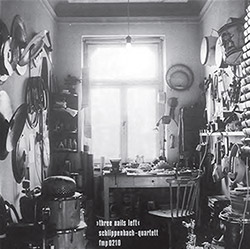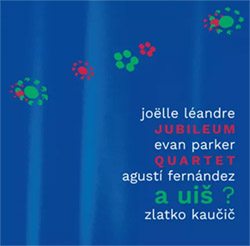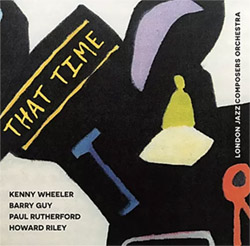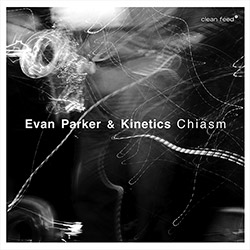![Foussat, Jean-Marc / Daunik Lazro / Evan Parker: Cafe OTO 2020 [2 CDs] (Fou Records) Foussat, Jean-Marc / Daunik Lazro / Evan Parker: Cafe OTO 2020 [2 CDs] (Fou Records)](https://www.teuthida.com/productImages/misc4/29342.jpg)
A momentous 2020 concert at London's Cafe OTO, presented in two discs, the 1st with label leader Jean-Marc Foussat in a solo improvisation on synth and voice, the 2nd in a trio with Daunik Lazro on tenor & baritone sax, and Evan Parker on soprano sax, the 2 saxophones weaving and responding to Foussat's remarkable alien soundscapes and vocalization in an immersive extended improvisation.
Save $1.70
In Stock
Quantity in Basket: None
Log In to use our Wish List
Shipping Weight: 2.00 units
Sample The Album:
Jean-Marc Foussat-synthesizer, voice
Daunik Lazro-tenor saxophone, baritone saxophone
Evan Parker-soprano saxophone
Click an artist name above to see in-stock items for that artist.
UPC: 3491570055328
Label: Fou Records
Catalog ID: FR-CD38/39
Squidco Product Code: 29342
Format: 2 CDs
Condition: New
Released: 2020
Country: France
Packaging: Cardboard Gatefold 3 Panels
Recorded live at Cafe OTO in London, UK, on January 22nd, 2020, by Jean-Marc Foussat and Paul Skinner.
"We are listening to a solo. And yet... one has already become two.
Jean-Marc Foussat has invented for himself a made-to measure instrument, in bringing an inextricable mix - it's his trademark - of all kinds of gleaned sounds, rumours, and 'sound postcards'. Andthenthe voice, solitary or choral: one voice but made up of all voices that are possible, and even some that aren't really voices.When he gives them expression, overlays them, confronts them, and pulls them apart, he selects the most diverse among them: captured there, in the moment, at the microphone; or extracted from the raw material; or else synthesised, outrageously at times. After all, as the phenomenologist says, 'a material obstacle (...) is only an opportunity for me to project myself towards other possibilities, it cannot give them an outside'
And those of us who lend our ears and listen to this 'outside', are its outside, which is to say that we are not 'inside' - not entirely, and not immediately.Without the presence of the 'other' - the voice that replays the other voices and manifests the outside - the outside would be an inside.In this internalised reflection of the outside, the voice reintroduces 'otherness'.Or rather manifests it. Isolated and multiplied, praying and chanting, falling in a curtain of rain, the voice runs in a counter current against the electronic stridulations that start the movement with a strikingly brutal and provocative nakedness. The dramatic action that follows is a measure of the respective force of the incitement; even the silence joins in.
And midway, between the surging forward and the retreat, in the liminal area where opposite forces overlap, looms the far away - the 'distant' that is beyond the categories of inside and outside.
Neither point of origin, nor destination, it is the edge of nothing. It is the home of pure emergence, of outpourings - gentle and violent by turn - and also of dissolution; a groundless ground. The outside and the inside become two sides of a reciprocal flow, and the reconfiguration continues, bringing about a decantation, a transfusion, which recreates, in the fabrication of the music itself, the very phenomenon of listening.
We are listening to three musicians. Not quite a trio, but also more than that. Evan Parker creates multiple threads in his voice and braids them together, Daunik Lazro shreds his to produce a sound that skins it, then sculpts its flayed form, and Jean-Marc Foussat brings out of the box all the voices in the world, adding a song that he diffracts, at leisure. Each musician manipulates the solo exercise in his own singular way, so that it is opened up and populated. A trio, even supposing that's what it really is, is always more than that. The third shatters the mirror-like relationship between the other two and, in any formation of this type, introduces the vanishing point of a factorial function. This feature isn't repeated with an increase in the number involved. But in this trio, beside the two saxophonists, the added presence of a electronic synthesiser, a sampler, and a voice processing device, significantly extends the sound palette. And the 'outside' is brought in.
Since the invention, in the 1960s, of free improvisation, Evan Parker and Daunik Lazro have tirelessly carved out a path, and invented new ways, sounds and symbols - a signature that has never been set in stone, as it has for their imitators. Jean-Marc Foussat had faithfully recorded them, in such close association over so many years, that his role as a sound engineer was that of a phantom musician whose presence was always with them, although he remained on the threshold. When he finally decided to cross it, it was with the invention of the tailor-made instrument mentioned earlier. Parker was also involved with the rainbow colours of Lawrence Casserley, and with Marteau Rouge and, therefore, Foussat, making a foursome. Lazro threw himself into the 'reported' atmospheres of Kristoff K. Roll; they joined their braids and their abrasions, to create sumptuous canvases, as a trio, with a third player, Joe McPhee.
The outside is what lies beyond a city. It's been a long time since Evan Parker and Daunik Lazro have crossed the walls, but here, together, in the singular arrangement mentioned before, it's quite a different story. What remains of their citadel is behind them - a blue silhouette in the mist of its confines. They venture out once more, into the village squares, into the peaceful life of a circle of dwellings, graft the elemental onto the organic, and rouse up the gathering, and the excitement. They take a step towards the disorder, face the chorus, straddling a raft of melancholies. They forget themselves and then, reborn, remember themselves again, carried back to one another by the water wheel of the outside, fed by inexhaustible springs, and regularly, sensitively and profoundly renewed.
And, from the rampart of our ear, we tune the eardrum to these rumoured sounds, and in its vibration we too re-invent ourselves, disarmed before we ever knew we were battle-hardened."-Philippe Alen, Inside, outside, and far away (English translation : Janette Parr)
Artist Biographies
• Show Bio for Jean-Marc Foussat "Jean-Marc Foussat (born March 19, 1955 in Oran ) is a French composer and improvisational musician ( guitar, piano, live electronics ). Since the mid-1970s, Foussat had belonged to groups such as Lézard Marçio, in which he contributed the sounds of concrete music with magnetic tapes. In 1981, he finished his first solo album, Abattage, which was released in 1983. In the ensemble Marteau Rouge (with the guitarist Jean-François Pauvros and the drummer Makoto Sato), he also collaborated with Evan Parker. Together with the saxophonist Sylvain Guérineau, he formed the duo Aliquid, which also appeared with Joe McPhee ( Quod, 2014). In addition to soloprograms, he also starred with Noël Akchoté / Roger Turner, Samuel Blaser, Émilie Lesbros, Jean-Luc Cappozzo, Sophie Agnel, Daunik Lazro and numerous other musicians, as well as the Fortuna 21 Octet of Raymond Boni and the department of education psychique on." ^ Hide Bio for Jean-Marc Foussat • Show Bio for Daunik Lazro "The French saxophonist Daunik Lazro combines a tart, piercing tone with a quick mind and a flexible philosophy of music-making. His professional start was in bassist Saheb Sarbib's orchestra, a relationship he maintained through most of the '70s, which included three recordings. His first steps playing his own music involved a radical resizing of the cast on-stage, going from orchestra playing to solo saxophone concerts and duets. In the '80s, he busily played with many on the European improvised music scene, including bassist Jean Jacques Avenel, cellist Tristan Honsinger, violinist Carlos Zingaro, drummer Christian Rollet, and saxophonist Evan Parker, among others. In the mid-'80s, Lazro expanded his partnerships to include dance and theater projects, including work with the Company of the Chance. He formed a particularly fine trio in 1987 with fellow saxophonist Michel Doneda and the brilliant ppercussionistLê Quan Ninh, playing at many of the major European festivals and also touring in Canada. Duets with the American free improviser Joe McPhee are a 1991 discographical highlight, during a period when Lazro also began playing viola. In 1993, he started his own orchestra as well as a quartet called Outlaws in Jazz with Jac Berrocal, Didier Levallet, and Dennis Charles. In 1995, he toured Europe in a triple-threat combination with both McPhee and Parker, and the former artist also joined him in a quartet the following year with the superb British contrabassist Paul Rogers. In the late '90s, he continued involvement with a series of orchestra projects, often as a guest soloist." ^ Hide Bio for Daunik Lazro • Show Bio for Evan Parker "Evan Parker was born in Bristol in 1944 and began to play the saxophone at the age of 14. Initially he played alto and was an admirer of Paul Desmond; by 1960 he had switched to tenor and soprano, following the example of John Coltrane, a major influence who, he would later say, determined "my choice of everything". In 1962 he went to Birmingham University to study botany but a trip to New York, where he heard the Cecil Taylor trio (with Jimmy Lyons and Sunny Murray), prompted a change of mind. What he heard was "music of a strength and intensity to mark me for life ... l came back with my academic ambitions in tatters and a desperate dream of a life playing that kind of music - 'free jazz' they called it then." Parker stayed in Birmingham for a time, often playing with pianist Howard Riley. In 1966 he moved to London, became a frequent visitor to the Little Theatre Club, centre of the city's emerging free jazz scene, and was soon invited by drummer John Stevens to join the innovative Spontaneous Music Ensemble which was experimenting with new kinds of group improvisation. Parker's first issued recording was SME's 1968 Karyobin, with a line-up of Parker, Stevens, Derek Bailey, Dave Holland and Kenny Wheeler. Parker remained in SME through various fluctuating line-ups - at one point it comprised a duo of Stevens and himself - but the late 1960s also saw him involved in a number of other fruitful associations. He began a long-standing partnership with guitarist Bailey, with whom he formed the Music Improvisation Company and, in 1970, co-founded Incus Records. (Tony Oxley, in whose sextet Parker was then playing, was a third co-founder; Parker left Incus in the mid-1980s.) Another important connection was with the bassist Peter Kowald who introduced Parker to the German free jazz scene. This led to him playing on Peter Brötzmann's 1968 Machine Gun, Manfred Schoof's 1969 European Echoes and, in 1970, joining pianist Alex von Schlippenbach and percussionist Paul Lovens in the former's trio, of which he is still a member: their recordings include Pakistani Pomade, Three Nails Left, Detto Fra Di Noi, Elf Bagatellen and Physics. Parker pursued other European links, too, playing in the Pierre Favre Quartet (with Kowald and Swiss pianist Irene Schweizer) and in the Dutch Instant Composers Pool of Misha Mengelberg and Han Bennink. The different approaches to free jazz he encountered proved both a challenging and a rewarding experience. He later recalled that the German musicians favoured a "robust, energy-based thing, not to do with delicacy or detailed listening but to do with a kind of spirit-raising, a shamanistic intensity. And l had to find a way of surviving in the heat of that atmosphere ... But after a while those contexts became more interchangeable and more people were involved in the interactions, so all kinds of hybrid musics came out, all kinds of combinations of styles." A vital catalyst for these interactions were the large ensembles in which Parker participated in the 1970s: Schlippenbach's Globe Unity Orchestra, Chris McGregor's Brotherhood of Breath, Barry Guy's London Jazz Composers Orchestra (LJCO) and occasional big bands led by Kenny Wheeler. In the late 70s Parker also worked for a time in Wheeler's small group, recording Around Six and, in 1980, he formed his own trio with Guy and LJCO percussionist Paul Lytton (with whom he had already been working in a duo for nearly a decade). This group, together with the Schlippenbach trio, remains one of Parker's top musical priorities: their recordings include Tracks, Atlanta, Imaginary Values, Breaths and Heartbeats, The Redwood Sessions and At the Vortex. In 1980, Parker directed an Improvisers Symposium in Pisa and, in 1981, he organised a special project at London's Actual Festival. By the end of the 1980s he had played in most European countries and had made various tours to the USA, Canada, Australia, New Zealand and Japan. ln 1990, following the death of Chris McGregor, he was instrumental in organising various tributes to the pianist and his fellow Blue Notes; these included two discs by the Dedication Orchestra, Spirits Rejoice and lxesa. Though he has worked extensively in both large and small ensembles, Parker is perhaps best known for his solo soprano saxophone music, a singular body of work that in recent years has centred around his continuing exploration of techniques such as circular breathing, split tonguing, overblowing, multiphonics and cross-pattern fingering. These are technical devices, yet Parker's use of them is, he says, less analytical than intuitive; he has likened performing his solo work to entering a kind of trance-state. The resulting music is certainly hypnotic, an uninterrupted flow of snaky, densely-textured sound that Parker has described as "the illusion of polyphony". Many listeners have indeed found it hard to credit that one man can create such intricate, complex music in real time. Parker's first solo recordings, made in 1974, were reissued on the Saxophone Solos CD in 1995; more recent examples are Conic Sections and Process and Reality, on the latter of which he does, for the first time, experiment with multi-tracking. Heard alone on stage, few would disagree with writer Steve Lake that "There is, still, nothing else in music - jazz or otherwise - that remotely resembles an Evan Parker solo concert." While free improvisation has been Parker's main area of activity over the last three decades, he has also found time for other musical pursuits: he has played in 'popular' contexts with Annette Peacock, Scott Walker and the Charlie Watts big band; he has performed notated pieces by Gavin Bryars, Michael Nyman and Frederic Rzewski; he has written knowledgeably about various ethnic musics in Resonance magazine. A relatively new field of interest for Parker is improvising with live electronics, a dialogue he first documented on the 1990 Hall of Mirrors CD with Walter Prati. Later experiments with electronics in the context of larger ensembles have included the Synergetics - Phonomanie III project at Ullrichsberg in 1993 and concerts by the new EP2 (Evan Parker Electronic Project) in Berlin, Nancy and at the 1995 Stockholm Electronic Music Festival where Parker's regular trio improvised with real-time electronics processed by Prati, Marco Vecchi and Phillip Wachsmann. "Each of the acoustic instrumentalists has an electronic 'shadow' who tracks him and feeds a modified version of his output back to the real-time flow of the music." The late 80s and 90s brought Parker the chance to play with some of his early heroes. He worked with Cecil Taylor in small and large groups, played with Coltrane percussionist Rashied Ali, recorded with Paul Bley: he also played a solo set as support to Ornette Coleman when Skies of America received its UK premiere in 1988. The same period found Parker renewing his acquaintance with American colleagues such as Anthony Braxton, Steve Lacy and George Lewis, with all of whom he had played in the 1970s (often in the context of London's Company festivals). His 1993 duo concert with Braxton moved John Fordham in The Guardian to raptures over "saxophone improvisation of an intensity, virtuosity, drama and balance to tax the memory for comparison". Parker's 50th birthday in 1994 brought celebratory concerts in several cities, including London, New York and Chicago. The London performance, featuring the Parker and Schlippenbach trios, was issued on a highly-acclaimed two-CD set, while participants at the American concerts included various old friends as well as more recent collaborators in Borah Bergman and Joe Lovano. The NYC radio station WKCR marked the occasion by playing five days of Parker recordings. 1994 also saw the publication of the Evan Parker Discography, compiled by ltalian writer Francesco Martinelli, plus chapters on Parker in books on contemporary musics by John Corbett and Graham Lock. Parker's future plans involve exploring further possibilities in electronics and the development of his solo music. They also depend to a large degree on continuity of the trios, of the large ensembles, of his more occasional yet still long-standing associations with that pool of musicians to whose work he remains attracted. This attraction, he explained to Coda's Laurence Svirchev, is attributable to "the personal quality of an individual voice". The players to whom he is drawn "have a language which is coherent, that is, you know who the participants are. At the same time, their language is flexible enough that they can make sense of playing with each other ... l like people who can do that, who have an intensity of purpose." " ^ Hide Bio for Evan Parker
4/17/2024
Have a better biography or biography source? Please Contact Us so that we can update this biography.
4/17/2024
Have a better biography or biography source? Please Contact Us so that we can update this biography.
4/17/2024
Have a better biography or biography source? Please Contact Us so that we can update this biography.
Track Listing:
CD1
1. Inventing Chimaeras 31:35
CD1
1. Present Manifeste 44:30
Improvised Music
Free Improvisation
Electro-Acoustic
Electro-Acoustic Improv
Recordings by or featuring Reed & Wind Players
Piano & Keyboards
Unusual Vocal Forms
European Improvisation, Composition and Experimental Forms
London & UK Improv & Related Scenes
Staff Picks & Recommended Items
Search for other titles on the label:
Fou Records.


![Foussat, Jean-Marc / Daunik Lazro / Evan Parker: Cafe OTO 2020 [2 CDs] (Fou Records) Foussat, Jean-Marc / Daunik Lazro / Evan Parker: Cafe OTO 2020 [2 CDs] (Fou Records)](https://www.teuthida.com/productImages/full/29342.Full.jpg)


